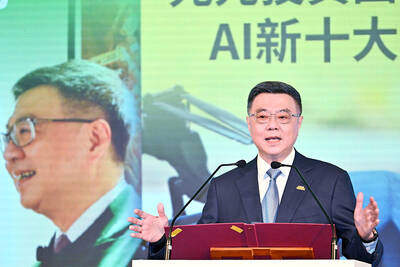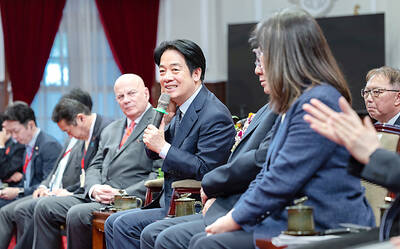The Taipei City Mall (
Joined by city councilors and well-known entertainers, Taipei Mayor Ma Ying-Jeou (馬英九) hosted the opening ceremony for the ambitious project, which took eight years to complete.
"Shopping here gives people shelter from the wind and rain, and the adjacent MRT system is convenient," Ma said.
The mall features 185 shopping units, and is located under Civil Boulevard, from Taching Street in the west to Kungyuan Road in the east.
The shopping area is divided into areas for food, consumer electronics, general merchandise, and clothing and accessories.
The new shopping center shares many of the advantages of the nearby Easy Mall, featuring direct links to transport centers, including the main railway station and Taipei's network of MRT lines.
It is also the new home for the 810 previous shop operators of the China Plaza (中華商場) on Chunghwa Road, which was demolished eight years ago.
The Taipei City government, under former mayor Huang Ta-chou (
The move is part of the government's compensation arrangements for these operators, city officials said.
Former China Plaza operators said they were happy with their new home.
"After eight years, we in the China Plaza have finally found a second home," said Lin Hsien-chung (
"For the past eight years, I have been fighting `guerrilla warfare' throughout the city," said a snack food operator who refused to be named, while serving food to a long queue of customers. "Now business is brisk, even on our first day here."
Current operators also included other business people who had rented space in the new mall from former China Plaza operators.
"I paid a monthly rental of NT$200,000 to six operators," said Kao Ming-tsun (
Visiting DPP City Councilor Yeh Hsin-yi (
"Some of these former China Plaza operators are earning income by renting out their assigned space to other people, and I think it's an expedient measure," Yeh said.
Yeh said the original design of 3.5 pings per unit was too small, and an investment in such a unit is doomed to failure.
It's sensible to allow several units to be combined as a single space and then to rent the space to others, he said.
But not every space was ready for operation yesterday.
The current mall management said only 50 percent of the shops were currently ready for possession -- and the early opening was to encourage business opportunities before the mall becomes fully operational.

Two US House of Representatives committees yesterday condemned China’s attempt to orchestrate a crash involving Vice President Hsiao Bi-khim’s (蕭美琴) car when she visited the Czech Republic last year as vice president-elect. Czech local media in March last year reported that a Chinese diplomat had run a red light while following Hsiao’s car from the airport, and Czech intelligence last week told local media that Chinese diplomats and agents had also planned to stage a demonstrative car collision. Hsiao on Saturday shared a Reuters news report on the incident through her account on social media platform X and wrote: “I

STILL ON THE TABLE: The government is not precluding advanced nuclear power generation if it is proven safer and the nuclear waste issue is solved, the premier said Taiwan is willing to be in step with the world by considering new methods of nuclear energy generation and to discuss alternative approaches to provide more stable power generation and help support industries, Premier Cho Jung-tai (卓榮泰) said yesterday. The government would continue to develop diverse and green energy solutions, which include considering advances in nuclear energy generation, he added. Cho’s remarks echoed President William Lai’s (賴清德) comments in an interview last month, saying the government is not precluding “advanced and newer nuclear power generation” if it is proven to be safer and the issue of nuclear waste is resolved. Lai’s comment had

‘BUILDING PARTNERSHIPS’: The US military’s aim is to continue to make any potential Chinese invasion more difficult than it already is, US General Ronald Clark said The likelihood of China invading Taiwan without contest is “very, very small” because the Taiwan Strait is under constant surveillance by multiple countries, a US general has said. General Ronald Clark, commanding officer of US Army Pacific (USARPAC), the US Army’s largest service component command, made the remarks during a dialogue hosted on Friday by Washington-based think tank the Center for Strategic and International Studies. Asked by the event host what the Chinese military has learned from its US counterpart over the years, Clark said that the first lesson is that the skill and will of US service members are “unmatched.” The second

STANDING TOGETHER: Amid China’s increasingly aggressive activities, nations must join forces in detecting and dealing with incursions, a Taiwanese official said Two senior Philippine officials and one former official yesterday attended the Taiwan International Ocean Forum in Taipei, the first high-level visit since the Philippines in April lifted a ban on such travel to Taiwan. The Ocean Affairs Council hosted the two-day event at the National Taiwan University Hospital International Convention Center. Philippine Navy spokesman Rear Admiral Roy Vincent Trinidad, Coast Guard spokesman Grand Commodore Jay Tarriela and former Philippine Presidential Communications Office assistant secretary Michel del Rosario participated in the forum. More than 100 officials, experts and entrepreneurs from 15 nations participated in the forum, which included discussions on countering China’s hybrid warfare